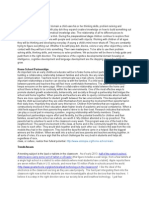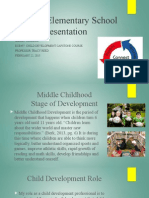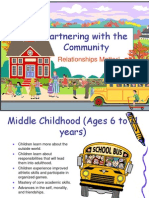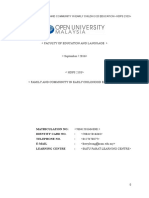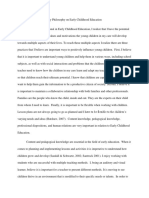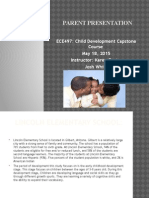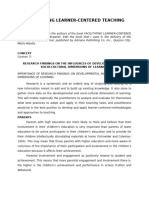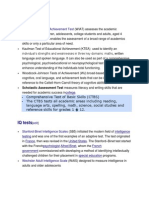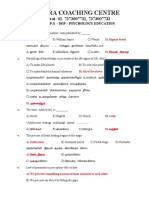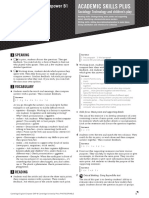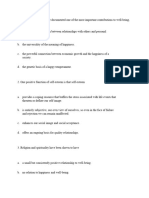Parent Presentation
Parent Presentation
Uploaded by
api-249476797Copyright:
Available Formats
Parent Presentation
Parent Presentation
Uploaded by
api-249476797Original Title
Copyright
Available Formats
Share this document
Did you find this document useful?
Is this content inappropriate?
Copyright:
Available Formats
Parent Presentation
Parent Presentation
Uploaded by
api-249476797Copyright:
Available Formats
Danielle Herrera ECE 497 Instructor: Kara OBrien March 9, 2014
Early childhood, ages 4-7 years: This is were they start to experience many changes. Their cognitive development start to develop. They start to change their beliefs into more about magical creatures and events (berk, 2013). This also the stage were they know that make believe is more representational activities ( berk, 2013).
Middle childhood, ages 7-11 years: At this age this is were there cognitive development start to develop more strongly. This is were they start to have a more organized thinking of concrete information (berk, 2013). They start to be more involved in conversations. They also start to experience more spatial thinking (berk, 2013).
Always guide the children to fellow what interest them.
Encourage children to make their own decisions. I will always provide activities and learning tools that will keep their interest in the learning process. I will help the children with the process of their cognitive, social, emotional, physical development. I will always be there for the children and I will also listen to the children needs. I will always make sure to be a supportive teacher to the children and their parents. I will provide a lesson plan that will be visually display, this way parents are able to view what their children are learning.
cognitive refers to the inner process and product of the mind that lead to knowing. The type of activities that would include is all mental activities such as remembering , symbolizing, categorizing, planning, reasoning, problem solving, creating and fantasizing ( berk, 2013). These are all things that middle and early childhood age start to develop.
Mesosystem: The second level of bronfenbrenners model, the mesosystem, encompasses connection between Microsystems, such as home, school, neighborhood and child care center ( berk, 2013). The interaction with children is not all about the classroom but it also has to happen in the home environment. The academic process also highly depends on the parents involvement in the school setting but also in the home environment ( berk, 2013). The type of interaction that they experience at home, will affect the experience in the classroom. Also depending on the type family, community that they come from can affect their learning process. In our text it stated parents that face with financial and other stressors are less likely to encourage their children to participate ( berk, 2013).
When parents are more involved in a child's life, it will make the child more successful in their education. When parents are involved it shows the child that their parents care for them. Then the child will want to do great in their education and in life. They will be more aware of family supervision and they will respect their parents. When parents show a good and positive environment such as good habits, values, then the child learning process will have a success process (Epstein, J). As teachers we need to understand more about the families background , culture, concerns, goals, needs and views, which will help figure out ways to implement the cultures of the families. Once we figure out everything, then we can have events that will be suitable for everyone needs. This way the school and the community could interact with each other.
Implements:
When having conferences with parents once a year it gives the parents and teachers the opportunity to talk to each other about how to improve the childs development.
When having a communication relationship with both parents and the children, it helps the process of the child learning because the teachers and parents are able to make plans and goals for the child, so that they are successful (Epstein, J). Teachers can have yearly conferences, so that they can decided on ways to better the childs education and their life. Having fun school event will help the parents get together to communicate with each other.
Implements:
When parents volunteer for schools, it helps the development of their children language. They are able to develop their skills of communicating with adults.
When parents volunteer it helps with their learning skills because parents are there interacting with the learning process. They learn about their surroundings. The school will find great ways to have parents volunteer in their children education. Such as scheduling time during the day for the parents to come in and help out. The schools are aware the parents abilities.
Implements:
When children experience learning at home, they gain the skills, abilities and test scores that is linked to homework and classroom work (Epstein, J).
When they experience a learning home environment, they may have a more positive attitude towards school work. They will also think of their parents as teachers. The children will want to work. Teachers should have homework that can involve the parents. Have students take books home, so that they can read to their parents, which the parents have to sign a form each night.
Implements:
When it comes to decision making it is very important to let children make some decisions. When parents let their children make some decisions, it helps with their language development and cognitive development. They learn how to be more reasonable with their own decisions.
Permit the child to make their own decisions in accord with readiness ( berk, 2013).
Implement:
It will help with the enhance of skills and talents through enriched curricular and extra curricular experience (Epstein, J).
They will be more of aware of future career and education. They will have more opportunities. Have event nights that teachers can involve parents and students to get together to learn about each other and it will also help with learning about different cultures.
Implements:
Berk, L. E. (2013).Child development. (9th ed.). Upper Saddle River, NJ: Pearson.
Bronfenbrenners Microsystems and Mesosystems. Retrieved from http://www.vvc.edu/academic/child_development/droege/ht/c ourse2/faculty/lecture/cd6lectmicro.html
Epstein, J (2013). Epstein's Framework of Six Types of Involvement. Retrieved from http://www.unicef.org/lac/Joyce_L._Epstein_s_Framework_of_S ix_Types_of_Involvement(2).pdf
You might also like
- Families and Educators Together: Building Great Relationships that Support Young ChildrenFrom EverandFamilies and Educators Together: Building Great Relationships that Support Young ChildrenNo ratings yet
- Parental Involvement - Final (Repaired)Document24 pagesParental Involvement - Final (Repaired)Jonel Mark Manlangit Rabe100% (2)
- Gioia Multiparadigm Perspectives in Theory BuildingDocument24 pagesGioia Multiparadigm Perspectives in Theory BuildingyuliayunitayusufNo ratings yet
- Bece 497 W 3 ADocument13 pagesBece 497 W 3 Aapi-277205794No ratings yet
- Presentation 1Document12 pagesPresentation 1api-351330683No ratings yet
- Week 3 - AssignmentDocument18 pagesWeek 3 - Assignmentapi-282479659100% (1)
- The Role of Parents in EducationDocument6 pagesThe Role of Parents in EducationJennifer Munoz HernandezNo ratings yet
- Parent PresentationDocument16 pagesParent Presentationapi-268213710No ratings yet
- Parent PresentationDocument13 pagesParent Presentationapi-269741432No ratings yet
- Parent LetterDocument5 pagesParent Letterapi-344328515No ratings yet
- Week 3 As 1Document12 pagesWeek 3 As 1api-367632595No ratings yet
- Partnering For Our Kids FinalDocument12 pagesPartnering For Our Kids Finalapi-256424585No ratings yet
- Parrie Lee Butler-Davis-Ece 497Document11 pagesParrie Lee Butler-Davis-Ece 497api-261849050No ratings yet
- Parent Presenation - Ece 497Document14 pagesParent Presenation - Ece 497api-263079141No ratings yet
- Parent Presentation 2 PDFDocument15 pagesParent Presentation 2 PDFNyika Shanell BouldrickNo ratings yet
- Week 3Document13 pagesWeek 3api-326110234No ratings yet
- Culturally Responsive ClassroomDocument13 pagesCulturally Responsive Classroomapi-290871561No ratings yet
- Presentation1 ParentDocument13 pagesPresentation1 Parentapi-289748229No ratings yet
- Parent School ConnectionDocument18 pagesParent School Connectionapi-261107205No ratings yet
- Running Head: Statement of Informed Beliefs 1Document8 pagesRunning Head: Statement of Informed Beliefs 1api-302824987No ratings yet
- Montessori in The Home and Connections To Parent EducationDocument30 pagesMontessori in The Home and Connections To Parent EducationAnca MariaNo ratings yet
- Chapter Two: Culturally Responsive and Inclusive Education 2.1 Family EngagementDocument4 pagesChapter Two: Culturally Responsive and Inclusive Education 2.1 Family Engagementapi-526069579No ratings yet
- FinalDocument3 pagesFinalapi-288418312No ratings yet
- Ece 497 Final Power PointDocument12 pagesEce 497 Final Power Pointapi-248441989No ratings yet
- Calendar Overview: October, November & DecemberDocument10 pagesCalendar Overview: October, November & Decemberapi-294381537No ratings yet
- Cbs ParentengageDocument8 pagesCbs Parentengageapi-288522248No ratings yet
- Literature ReviewDocument11 pagesLiterature Reviewapi-317561166No ratings yet
- Ece497 Parent PresentationDocument14 pagesEce497 Parent Presentationapi-280799540No ratings yet
- Situation Analysis "When Parents Become Involved, Children Do Better in School, and They Go ToDocument30 pagesSituation Analysis "When Parents Become Involved, Children Do Better in School, and They Go ToSylvia EstoestaNo ratings yet
- Ece 497 Week 3 AssignmentDocument15 pagesEce 497 Week 3 Assignmentapi-290660870No ratings yet
- Action Research AssignmentDocument5 pagesAction Research AssignmentFayolaminataNo ratings yet
- Flip Book - Suad TalebDocument11 pagesFlip Book - Suad Talebapi-338878533No ratings yet
- Final SibDocument8 pagesFinal Sibapi-315760909No ratings yet
- THE Rato Bangala School Early Childhood CenterDocument5 pagesTHE Rato Bangala School Early Childhood CenterRishi KarkiNo ratings yet
- Ece 497 WK 3 AsmtDocument12 pagesEce 497 WK 3 Asmtapi-255217309No ratings yet
- Parent PresentationDocument4 pagesParent Presentationapi-418615906No ratings yet
- Family and Community in Early Childhood EducationDocument14 pagesFamily and Community in Early Childhood EducationKerry LeongNo ratings yet
- SMDocument6 pagesSMFatin ZainNo ratings yet
- Supple Poster Presentation FinalDocument1 pageSupple Poster Presentation Finalapi-261120104No ratings yet
- Presentationweek 3Document13 pagesPresentationweek 3api-285385451No ratings yet
- Finaldraft2 1Document7 pagesFinaldraft2 1api-354956404No ratings yet
- Final Performance ProjectDocument11 pagesFinal Performance Projectapi-391628725No ratings yet
- Chapter 1Document15 pagesChapter 1Denmark Simbajon MacalisangNo ratings yet
- Chapter 1Document15 pagesChapter 1Denmark Simbajon MacalisangNo ratings yet
- 2Document4 pages2api-526069443No ratings yet
- Parent Child Relationships PDFDocument6 pagesParent Child Relationships PDFEffe FizfeNo ratings yet
- Inquiry Brief FinalDocument2 pagesInquiry Brief Finalapi-242817193No ratings yet
- Notes 7 Facilitating Learner Centered TeachingDocument4 pagesNotes 7 Facilitating Learner Centered Teachingshellabagahansol893No ratings yet
- Learn From NatureDocument8 pagesLearn From Natureapi-340164266No ratings yet
- Effective Homework Strategies: Instruction, Just Do It, #2From EverandEffective Homework Strategies: Instruction, Just Do It, #2No ratings yet
- Week3assignmentfinal DebrawilliamsDocument15 pagesWeek3assignmentfinal Debrawilliamsapi-281040363No ratings yet
- Dsib EssayDocument7 pagesDsib Essayapi-285609192No ratings yet
- Responsive Inclusive Experience FamilyDocument6 pagesResponsive Inclusive Experience Familyapi-737619089No ratings yet
- Ece 497 Week 3 Assignmt Parent PresentationDocument19 pagesEce 497 Week 3 Assignmt Parent Presentationapi-281034615No ratings yet
- Grounded Theory 3Document40 pagesGrounded Theory 3ichaNo ratings yet
- Final! CHAPTER-1-AND-2-4ndrrDocument31 pagesFinal! CHAPTER-1-AND-2-4ndrrjaycy.tongohanNo ratings yet
- Part 1: Classroom Management Plan For First GradeDocument5 pagesPart 1: Classroom Management Plan For First Gradeapi-499218850No ratings yet
- 994-Article Text-1841-1-10-20220512Document22 pages994-Article Text-1841-1-10-20220512Aluzia MontemayorNo ratings yet
- Review of LiteratureDocument10 pagesReview of LiteratureJj GomezNo ratings yet
- This is Play: Environments and Interactions that Engage Infants and ToddlersFrom EverandThis is Play: Environments and Interactions that Engage Infants and ToddlersRating: 4 out of 5 stars4/5 (1)
- Teun A Van Dijk & Walter Kintsch - Strategies of Discourse ComprehensionDocument389 pagesTeun A Van Dijk & Walter Kintsch - Strategies of Discourse Comprehensionaarne_seppelNo ratings yet
- Machine LearningDocument40 pagesMachine LearningKailash Kumar Kailly100% (1)
- Course Outline: International Islamic University MalaysiaDocument5 pagesCourse Outline: International Islamic University MalaysiaAin Mastura BurhanudinNo ratings yet
- AI, A Blessing or A CurseDocument2 pagesAI, A Blessing or A Cursephonethantmin0108No ratings yet
- Norms Without Values, Philosophical Reflections On Carl Schmitt's Tyranny of Values - Paola Premoli de MarchiDocument13 pagesNorms Without Values, Philosophical Reflections On Carl Schmitt's Tyranny of Values - Paola Premoli de MarchiAnonymous eDvzmvNo ratings yet
- Epistemologies in Geography - Kitchin Tate, 2000 PDFDocument14 pagesEpistemologies in Geography - Kitchin Tate, 2000 PDFCindy castañoNo ratings yet
- Lesson PlanDocument5 pagesLesson PlanAyu AnggitaNo ratings yet
- Suphat SukamolsonDocument20 pagesSuphat Sukamolsonenock_tuangNo ratings yet
- Leadership - Unit 2 Discussion AssignmentDocument4 pagesLeadership - Unit 2 Discussion AssignmentGhiath Alddin ZeenNo ratings yet
- InvoiceDocument1 pageInvoicebaanetsemakolaNo ratings yet
- Hypothesis Space and Inductive BiasDocument5 pagesHypothesis Space and Inductive BiasCandy AngelNo ratings yet
- Minutes: Financial EducationDocument7 pagesMinutes: Financial Educationtenang10No ratings yet
- Wanted Poster TaskDocument3 pagesWanted Poster Taskapi-266542296No ratings yet
- Week 2 Day 3Document5 pagesWeek 2 Day 3Acire NonacNo ratings yet
- How To Write A Term PaperDocument2 pagesHow To Write A Term PaperglzhcoaegNo ratings yet
- List of Ability TestsDocument4 pagesList of Ability Testskeziah0% (1)
- Communicative Method, Direct Method, Bilingual Approach and Eclectic ApproachDocument7 pagesCommunicative Method, Direct Method, Bilingual Approach and Eclectic ApproachSmk KespnNo ratings yet
- Madura Coaching Centre: Madurai-01. 7373007731, 7373007732Document6 pagesMadura Coaching Centre: Madurai-01. 7373007731, 7373007732M MuruganNo ratings yet
- Peter Principle - ReflectionDocument1 pagePeter Principle - ReflectionJohn Paul AtienzaNo ratings yet
- Possessive FormsDocument7 pagesPossessive FormsBustami Muhammad SidikNo ratings yet
- Lecture 8 Semantic Structure of The Word and PolysemyDocument26 pagesLecture 8 Semantic Structure of The Word and PolysemyАнна МихееваNo ratings yet
- Writing: Band Task Response Coherence and Cohesion Lexical Resource Grammatical Range and Accuracy 9Document1 pageWriting: Band Task Response Coherence and Cohesion Lexical Resource Grammatical Range and Accuracy 9abi iiNo ratings yet
- Mapeh 5 - Q4 - W5 DLLDocument13 pagesMapeh 5 - Q4 - W5 DLLromanieltengson100% (1)
- Heinz Kohut's Theory of NarcissismDocument5 pagesHeinz Kohut's Theory of NarcissismCristian Gutiérrez VeraNo ratings yet
- Effective QuestioningDocument29 pagesEffective QuestioningMichael Bahian DodonganNo ratings yet
- Empower B1 - Academic Skills Teacher - U07Document2 pagesEmpower B1 - Academic Skills Teacher - U07No NameNo ratings yet
- AssignmentDocument6 pagesAssignmentazizur rehmanNo ratings yet
- MCQ of Positive Psychology Dse 1 B A Sem 5 (2018-2021)Document20 pagesMCQ of Positive Psychology Dse 1 B A Sem 5 (2018-2021)sonisk979504No ratings yet
- Test 1Document6 pagesTest 1phuong toNo ratings yet






















